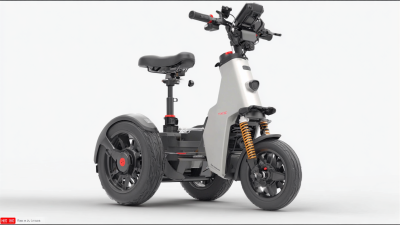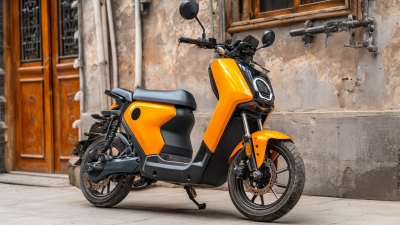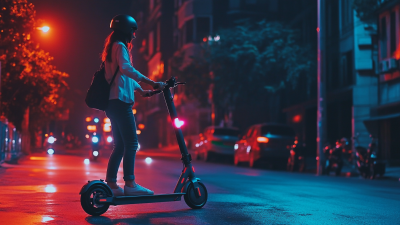In recent years, the demand for 3 Wheel Electric Scooters has surged significantly, driven by growing urban congestion and the need for efficient, eco-friendly transportation solutions. According to a report by Allied Market Research, the global electric scooter market is projected to reach over $41 billion by 2027, expanding at a commendable CAGR of 7.5% from 2020 to 2027. As businesses increasingly seek cost-effective alternatives for last-mile deliveries and employee transportation, investing in 3 Wheel Electric Scooters is becoming a viable option. These scooters not only offer enhanced stability and maneuverability but also appeal to a wide range of industries, including logistics, hospitality, and urban commuting. Understanding the unique features and benefits of 3 Wheel Electric Scooters is essential for businesses aiming to stay competitive in an evolving market, making it crucial to choose the right scooter that aligns with specific operational needs.

When selecting a 3 wheel electric scooter for your business, consider the weight capacity and size of the scooter. Businesses with heavier loads should prioritize scooters designed to carry more weight efficiently. Additionally, a compact design may be crucial if navigating tight spaces or urban environments is a common requirement. Ensure that the scooter has a comfortable seating arrangement and proper storage options to facilitate daily operations.
Battery life and charging time are essential factors to consider. A scooter with a long battery life will ensure that your business operates smoothly, reducing downtime caused by charging. Look for models that offer quick charging options to maintain efficiency throughout the day.
Finally, evaluate the safety features of the scooter. Stability, good braking systems, and visibility are crucial, especially if your business involves traveling in busy areas. Ergonomic designs that enhance control and maneuverability can significantly improve the overall safety of day-to-day operations. Regular maintenance checks and quality inspections will also ensure a long-lasting investment in your business.
When selecting a 3 wheel electric scooter for your business, understanding the various types available is essential to finding the perfect fit for your needs. There are several categories to consider, including heavy-duty scooters designed for rugged terrain and lightweight models ideal for urban landscapes. Heavy-duty scooters often come with robust construction and a higher weight capacity, making them suitable for transporting goods or navigating uneven ground. In contrast, lightweight options prioritize portability and ease of maneuvering, perfect for quick deliveries or short trips.
Tip: Before making a choice, assess the typical routes you will take. If your business frequently requires travel over rough paths, invest in a scooter that features durable tires and a strong frame. For city commuting, look for models with smaller turning circles and comfortable seating to enhance the user experience.
Another key distinction lies in the power and speed of the scooter. While some businesses may benefit from faster models for expedited deliveries, others might prioritize battery life and range for extended use throughout the day. It's critical to match the scooter's specifications with your operational demands to maximize efficiency.
Tip: Always check the scooter’s battery range, especially if you plan to cover long distances. Choosing a scooter with a longer battery life can prevent interruptions in service and keep your business running smoothly.

When evaluating performance and efficiency in three-wheel electric scooters for business needs, several critical factors come into play. With the increasing popularity of electric mobility solutions, it's essential to consider features such as battery life, speed, and overall build quality. Recent advancements in electric scooters show that manufacturers are focusing on creating high-performance models that meet varied consumer demands. For example, scooters with optimized electric assist mechanisms have been gaining traction, enhancing both speed and energy efficiency, making them a practical choice for urban commuting and deliveries.
Additionally, practical considerations like weight capacity, maneuverability, and ease of use directly impact operational efficiency. Emerging brands are consistently innovating, introducing models equipped with robust batteries that can sustain longer journeys without frequent recharging. This focus on enhanced functionality and user-friendliness allows businesses to maximize their investment in electric scooters, ultimately leading to improved service delivery and customer satisfaction. As these trends continue, choosing the right scooter for your business will increasingly hinge upon understanding the balance between these performance factors and how they align with your specific operational needs.
| Model | Max Speed (mph) | Range (miles) | Weight Capacity (lbs) | Battery Type | Charge Time (hours) | Cost (USD) | Features |
|---|---|---|---|---|---|---|---|
| Model A | 15 | 30 | 300 | Lithium-ion | 8 | 1,200 | LED lights, Foldable |
| Model B | 18 | 25 | 250 | Lead Acid | 10 | 800 | Adjustable seat, Anti-theft |
| Model C | 12 | 40 | 350 | Lithium-ion | 6 | 1,500 | Smart display, USB charging port |
| Model D | 14 | 20 | 400 | Lithium-ion | 7 | 1,100 | Rearview mirrors, Parking brake |
When selecting a three-wheeled electric scooter for business purposes, safety features should be a top priority. Look for models equipped with robust braking systems, such as hydraulic brakes, which provide better stopping power in various weather conditions. Additionally, ensure that the scooter has a sturdy frame with a low center of gravity to enhance stability and reduce the risk of tipping over during use.
Another vital safety aspect to consider is visibility. Opt for scooters that come with built-in lights, reflectors, and indicators to ensure that operators can be seen by other vehicles and pedestrians, especially in low-light conditions. Some newer models even boast anti-theft features, which add an extra layer of security, protecting your investment against theft. An electric scooter equipped with these essential safety features can significantly enhance operational efficiency while ensuring the safety of its rider and others on the road.
When selecting the right 3-wheel electric scooter for your business needs, understanding the balance between cost and value is crucial. According to the Electric Scooter Report 2023, the average cost of a commercial-grade electric scooter can range from $1,500 to $3,000, depending on specifications and features. Investing in a higher-end model often pays off, as it typically includes better battery life, enhanced safety features, and a longer lifespan, which can translate into reduced operational costs in the long run.
Budgeting for an electric scooter requires a careful analysis of both initial expenditure and ongoing costs. A study by the Institute of Transportation Engineers indicated that businesses could save up to 40% on transportation costs by switching to electric scooters over traditional vehicles. Moreover, considering potential subsidies or tax incentives for electric vehicle purchases can further enhance the value proposition. By aligning your budget with a thorough understanding of your operational needs, you can ensure that your investment in a 3-wheel electric scooter pays off both financially and operationally.







